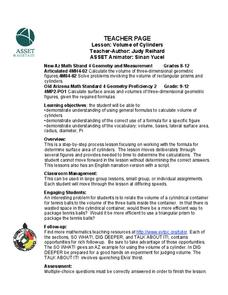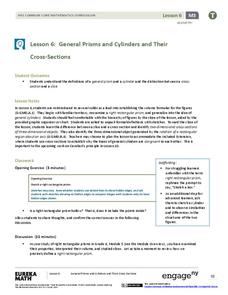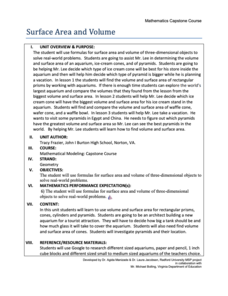Curated OER
Rectangular Prisms (D)
In this volume and surface area activity, 7th graders find the volume and surface area for the rectangular prisms. Students solve 3 problems.
EngageNY
Definition and Properties of Volume
Lead a discussion on the similarities between the properties of area and the properties of volume. Using upper and lower approximations, pupils arrive at the formula for the volume of a general cylinder.
Teach Engineering
Boxed In and Wrapped Up
If cubes have the smallest surface area, why aren't there more cube-shaped packages? Scholars take a box in the shape of a rectangular prism, cut it up, and make new boxes in the shape of cubes with the same volume. They then brainstorm...
Curated OER
Volume of Cylinders
Middle and high schoolers calculate the volume of cylinders. In this geometry lesson, learners differentiate between rectangular prisms and cylinders. They use the correct formula to solve for each solid.
EngageNY
General Prisms and Cylinders and Their Cross-Sections
So a cylinder does not have to look like a can? By expanding upon the precise definition of a rectangular prism, the lesson develops the definition of a general cylinder. Scholars continue on to develop a graphical organizer...
Curated OER
Volume
For this finding volume practice worksheet, learners sharpen their problem solving skills as they solve six story problems.
Shodor Education Foundation
Surface Area of Rectangular Prism
With this interactive lesson, learners compute the surface area of rectangular prisms. They visit an online investigation applet and record data on the provided handout. Pair this lesson with the volume lesson by the same publisher as an...
Curated OER
Volume of a Rectangular Prism
Children use the length, width, and height of an object to calculate the volume of a rectangular prism. They observe how to multiply three numbers at a time, and define volume. Pupils observe as the teacher demonstrates how to determine...
Curated OER
New Boxes From Old
Students find the volume and surface area of a rectangular box (e.g., a cereal box), and then figure out how to convert that box into a new, cubical box having the same volume as the original. As they construct the new, cube-shaped box...
Virginia Department of Education
Out of the Box
There's no need to think outside the box for this one! Scholars measure the length, width, and height of various boxes. Results help develop the formulas for the surface area and volume of rectangular prisms.
Curated OER
Volume of Solids: Algebra/Geometry Institute
Use this volume of solids lesson to have learners find the surface area and volume of cylinders, pyramids, and prisms. They place cubes inside three-dimensional figures to determine the volume. Worksheets and answers are provided.
Curated OER
Two for One Box Company: Student Worksheet
Fifth and sixth graders work alone or in pairs to determine the volume of paper boxes of various dimensions. Pupils write ratios of dimensions and volumes.
Curated OER
Problem Solving - Use a Formula 21.7
In this formula worksheet, students complete a graphic organizer, answering the questions relating to: understand, plan, solve, look back. Students solve 2 problems. Houghton Mifflin test is referenced.
Curated OER
Perimeter, Area, Volume and Surface Area
In this perimeter of shapes worksheet, 10th graders find the perimeter of the shapes illustrated. Then, they find the volume of each shape shown. Students also match the shape with its correct name on the left and find the surface area...
Curated OER
Geometry Practice: Volume
For this volume worksheet, students find the volume of 6 solids. Students find the volume of rectangular and triangular prisms.
EngageNY
The Volume of Prisms and Cylinders and Cavalieri’s Principle
Young mathematicians examine area of different figures with the same cross-sectional lengths and work up to volumes of 3D figures with the same cross-sectional areas. The instruction and the exercises stress that the two...
Virginia Department of Education
Surface Area and Volume of a Cylinder
Surface area or volume? Pupils first review the difference between surface area and volume. They then use a two-dimensional net that helps them develop formulas for the surface area and volume of cylinders.
Curated OER
Volumes of Solids
In this volume worksheet, students observe diagrams and extrapolate the correct items to plug into a formula for volume. They find the volume of triangular prisms, cylinders, cones, rectangular prisms, and rectangular pyramids. Four of...
Curated OER
Volume of Prisms-Homework #1
In this volume of prisms worksheet, young scholars compute the volume of nine shapes. Answers are given on the page, students are directed to show formulas and computations. The worksheet contains two each of rectangular prisms,...
CK-12 Foundation
Area and Volume of Similar Solids: Similar Solids
Five questions make up an interactive designed to boosts knowledge of area and volume of solid figures. Question types include multiple-choice, true or false, and fill-in-the-blank. A scale model changes measurement to provide a visual...
Radford University
Surface Area and Volume
Who knew there were pyramids in China? Learners apply surface area and volume formulas to several different real-world situations. They calculate the volume and surface area of an aquarium, an ice cream cone, and Egyptian and Chinese...
Curated OER
Rectangular Prisms (B)
In this rectangular prisms activity, learners find the volume and surface area of 3 rectangular prisms using the information provided.
Youth Education Services
Relating Volume in 3D Objects with Ten Problems
A fabulous four-page assignment explores volume formulae for rectangular prisms, cylinders, cones, and pyramids. Pupils apply the formulas to solve problems, match diagrams to values, and address real-world scenarios. A detailed answer...
Curated OER
NetsS.A. of Prisms
Students build nets of three-dimensional prisms based on the dimensions they are given for hexagonal prism, triangular prism, rectangular prism. Working in groups, they use their prisms and calculate the Surface Area and Lateral Area.

























